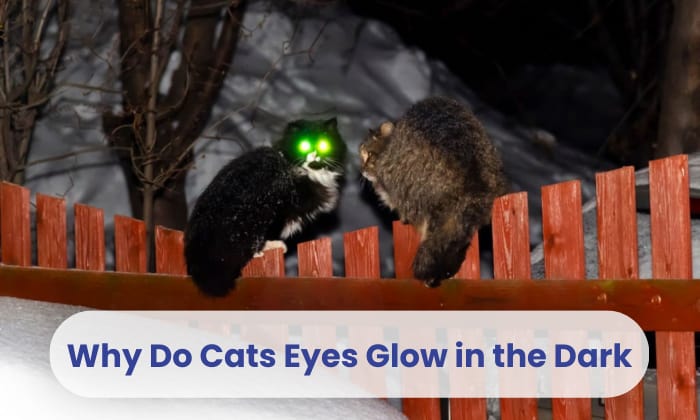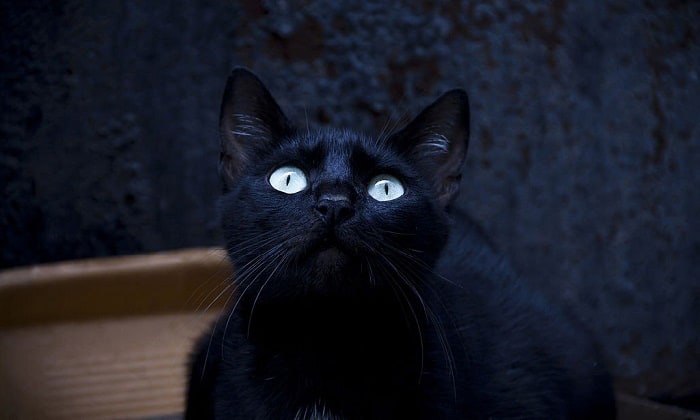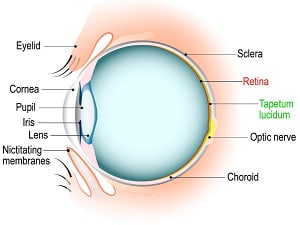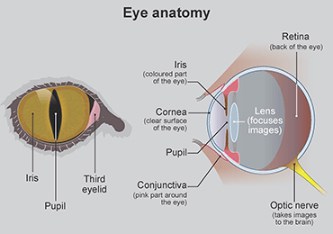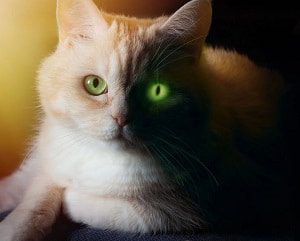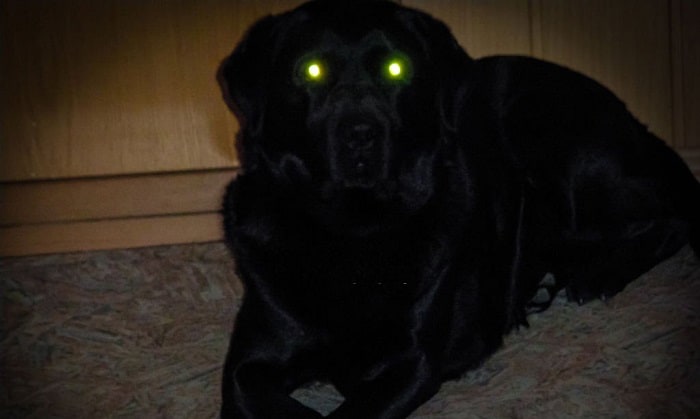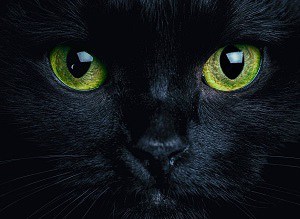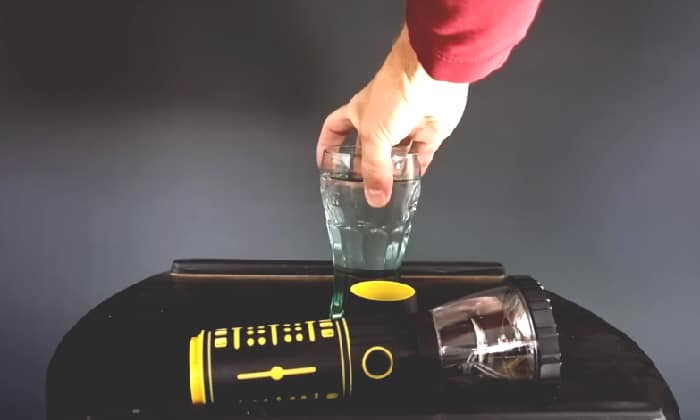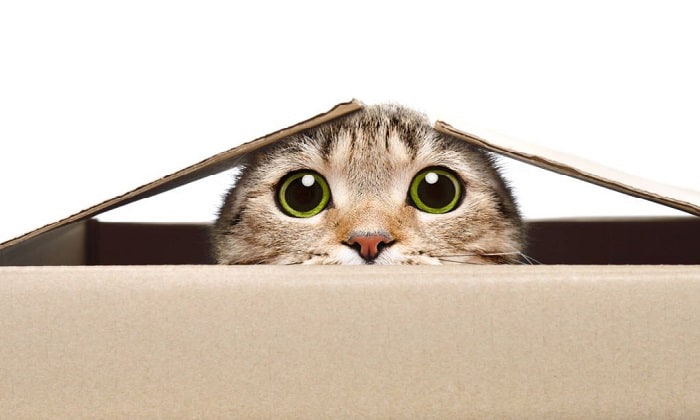Cats are renowned for being masters of the black night, with their sleek silhouettes and nimble paws allowing them to creep silently through the night. But aren’t you curious “why do cat’s eyes glow in the dark?”
When exposed to low levels of light, the eyes of your little Mr. Smitten, the cat, seem to shine with a magical sparkle that is both fascinating and eerie. So, how does this happen, and why does it glow in the dark?
The answer lies in the distinctive layer of tissue at the back of your tiny furball’s eyes called the tapetum lucidum. The layer’s reflective cells help amplify and enhance the available light, giving cats an edge in low-light conditions and causing their eyes to appear vibrant in dim surroundings.
Table of Contents
Here is a Meowy Detailed Explanation!
A cat’s eyes at night are indeed genuinely mesmerizing! Have you ever seen a cat’s eyes glowing or wondered how a cat can see in darkness? Well, it’s all thanks to their unique anatomy!
But, what causes the glowing?
Your kitty’s eyes shimmer in a dim environment due to a unique reflective layer behind its retina called the tapetum lucidum, also known as “eyeshine.”
This layer acts like a teeny-tiny mirror, reflecting light through the retina and increasing the light their eyes absorb and process.
Moreover, the reflected light will create a bright, luminous appearance in a cat’s eyes in the dark!
Peering into the anatomy and the mechanism
To be much more specific, let us peer into the anatomy and the mechanism behind your little cat’s glowing eyes.
When light hits a cat’s eye, it passes through the lens and reaches the retina at the back of the eye. After that, it sends signals to the brain, which processes the information and forms an image.
However, not all of the light is immediately absorbed by the retina. The eyeshine reflects some of the light back through, allowing it a second opportunity to be absorbed.
This reflection of light is what causes the eyes of Mr. Sushi, the cat, to appear to glow in nightly surroundings! Simply put, the eyeshine acts like a mirror that gives Floofy, the cat’s eyes an extra brightness boost.
Furthermore, what makes your fluffy cat’s tapetum lucidum even more unique is that it contains a type of vitamin B compound called riboflavin.
Riboflavin has a particular property that helps in intensifying light conditions to a specific wavelength for cats to see well, allowing their eyes to be susceptible to dim conditions.
And because the riboflavin present in the unique layer reflects light differently depending on the angle, cats’ eyes can glow in different colors, too, ranging from green to yellow to blue!
Exploring the diverse brilliance of cats’ eyeshine
Interestingly, not all kittens’ eyes glow in the same way. Some cats’ eyes glow green, while others might have a golden or yellow gleam.
The hue of the glow relies on the pigmentation of the reflective layer, which can vary from cat to cat. The color of the sheen luminance can also vary depending on the angle of the light hitting the eye.
Remember, not all cats have the same level of reflection in their eyes, and some cats may not exhibit the glowing effect at all. This can be due to differences in their eye structure or genetics.
Did You Know That the Eyes of Other Animals Glow in the Dark, Too?
The eyeshine mechanism is not unique to cats—it’s found in many other animals, including dogs, deer, and some rodents.
The glowing effect can vary in color and intensity depending on the species, with some appearing to glow bright white or yellow. In contrast, others have a green or red glow.
The purpose of this reflective layer is to enhance the animal’s night vision, allowing them to see in low-light conditions and to locate prey or avoid predators.
Do humans’ eyes glow in the dark?
No, humans’ eyes do not glow in the dark. This is because humans do not have the tapetum lucidum—a reflective layer behind the retina in some animals’ eyes.
It allows them to see better in low-light conditions and gives their eyes a glowing appearance in dim conditions.
The Mechanism: A Brief Demonstration
With all of the technical terms you’ve come across while reading the explanation we provided in this article, you still wonder, “but how do cat eyes work? Is there a much simpler demonstration about it?”
Worry not, dear! Here’s a short experiment you can perform at home to understand how the amazing eyeshine functions. And also to give you an idea about the reflective layer that helps cats see clearly at night.
You Will Need:
- Flashlight
- A clear glass container
- Water
What To Do:
- Find a dim room where you can clearly see the wall.
- Place the glass container about 6 inches away from a wall.
- Next, turn on the flashlight and shine it through the glass facing the wall. Observe how the light appears.
- Now, fill the container with water and return it to its original place.
- Turn on your flashlight again through the glass towards the wall, but this time with the water-filled container. Observe.
This experiment demonstrates how a reflective layer, like the tapetum lucidum in a feline’s eyes, can change the presence of light on the retina.
Without the water, the light from the flashlight shines straight through the glass and onto the wall. With the water, however, the light hits the water. It is then reflected back, creating a brighter, more dispersed appearance on the wall.
This is similar to how the eyeshine reflects light back through a cat’s retina, increasing the amount of light available for the cat to see in low-light conditions.
Frequently Asked Questions
What does it mean when only one of my cat’s eyes glows?
Suppose only one of your cat’s eyes glows in the darkness. In that case, it could be that your cat’s eye might just be facing at an angle that is unreachable by the light! But still, it could also indicate an underlying medical condition.
Naturally, a cat’s eyes are reflective, so the glow effect from their eyeshine should be present in both eyes.
It’s essential to monitor your cat’s eyes and take them to a veterinarian if you notice any unusual changes, including differences in the appearance of their eyes.
Conclusion
In conclusion, cats’ eyes glow at night due to the reflective layer— the tapetum lucidum—enhancing their night vision.
The color of the shine depends on the pigmentation of the eyeshine and the angle of the light hitting the eye. While not all kitties exhibit the glowing effect, it’s a fascinating feature that helps them see clearly in low-light conditions and highlights their impressive evolution as nocturnal predators!
We hope you learned something on this journey: “why do cats eyes glow in the dark!”

I am Amy Sawy, a Doctor of Veterinary Medicine (DVM) graduate from the University of Kansas. y husband, Dr. Plummer, and I own a veterinary clinic in Phillipsburg, Kansas. In addition to my professional background, I am a devoted pet owner myself, with a household that includes dogs, rodents, and most notably, cats – a total of five felines in my home.
In 2020, I joined an organization as a professional writer, leveraging my experience and collaborating with my team to deliver the most valuable information for your cat’s care.


